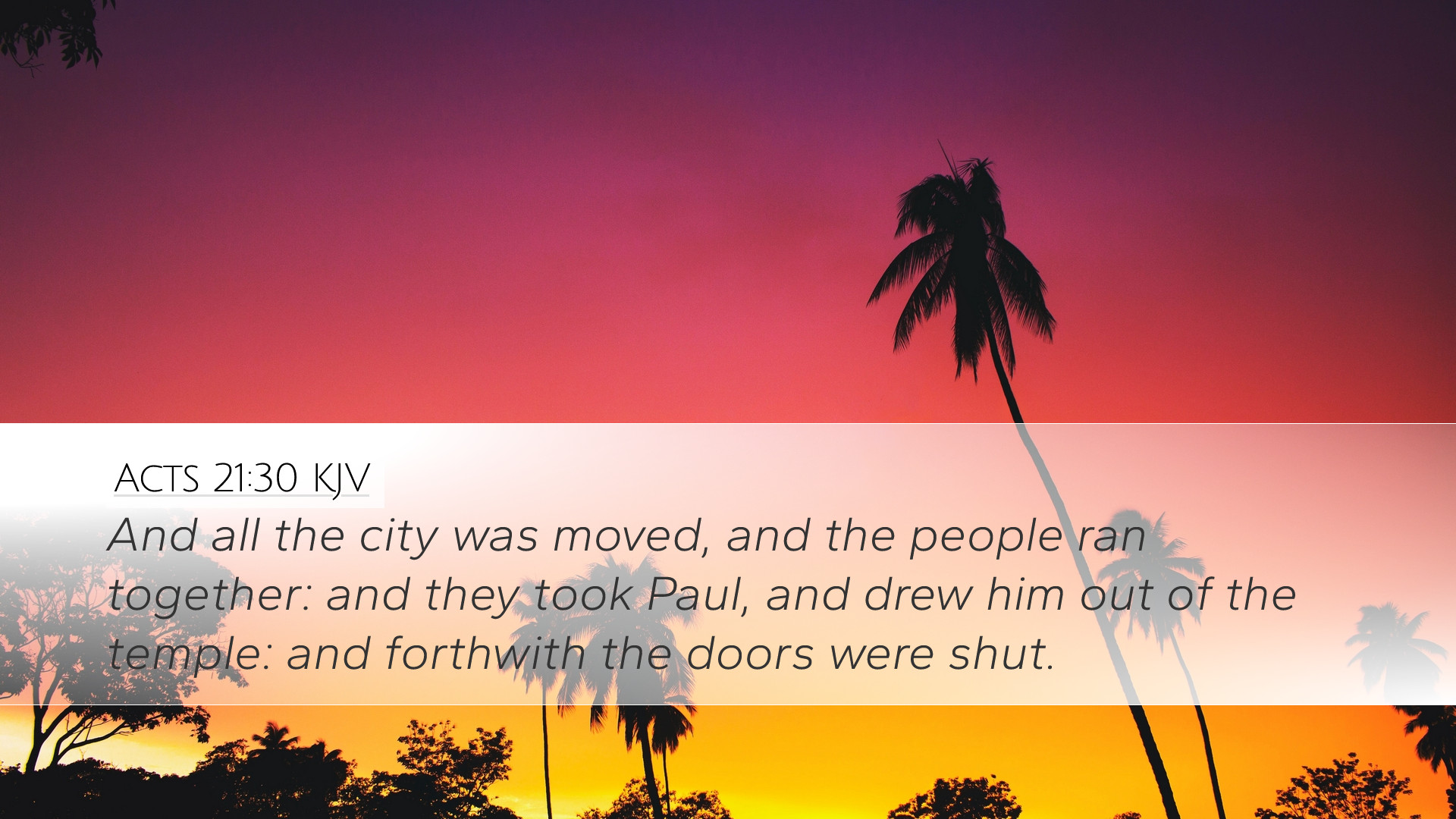Commentary on Acts 21:30
Acts 21:30 (KJV): "And all the city was moved, and the people ran together: and they took Paul, and drew him out of the temple: and forthwith the doors were shut."
Introduction
The events surrounding Acts 21:30 are pivotal in understanding the opposition faced by the early church and the significance of Paul’s ministry among the Gentiles. This verse encapsulates a moment of heightened tension in Jerusalem, illustrating the intersection of cultural, religious, and political strife.
Contextual Analysis
This verse occurs during a period of conflict between early Christians and Jewish authorities. Paul, once a zealous persecutor of Christians, became a fervent apostle. His recent arrival in Jerusalem stirred much controversy, primarily because of reports suggesting he taught against Jewish customs.
To better understand this moment, we must consider the larger narrative leading up to it, notably the tumultuous reactions to the gospel among the Jewish populace.
Insights from Matthew Henry
Matthew Henry emphasizes the chaotic nature of the scene. He describes how the entire city was stirred as a result of false accusations against Paul, suggesting that mob mentality can often obscure rational judgment. Henry notes that the public outcry and quick mobilization of the people to seize Paul highlights the volatility of religious sentiment at the time.
Key observations from Henry:
- The nature of mob violence: When individuals act collectively, particularly in a religious fervor, reason frequently gives way to passion.
- The role of false accusations: Just as Paul faced baseless claims that caused significant strife, ministers today must remain vigilant against distorted narratives.
- The swift actions of the mob: Their immediate reaction serves as a warning of how quickly public opinion can shift to hostility without due process.
Insights from Albert Barnes
Albert Barnes provides a theological interpretation that sheds light on Paul’s character during this crisis. He portrays Paul as undeterred, unwavering in his mission despite the backlash he faces. Barnes mentions that Paul’s commitment to his ministry is a testament to his faith and conviction in Christ.
Key observations from Barnes:
- Paul’s resolve: In the face of danger, Paul's actions exemplify the calling for all believers to stand firm in their faith.
- The shutting of the temple doors: This represents an ominous sign; the presence of God, once exclusive to the temple, is now leaving as unrest grows.
- The public assembly: The gathering of the people signifies a longing for justice, albeit misguided in their approach to Paul’s ministry.
Insights from Adam Clarke
Adam Clarke elaborates on the significance of the temple in Jewish life, emphasizing that it served as the spiritual heart of Jerusalem. By forcibly removing Paul from the temple area, the mob signified a spiritual rejection of the message he preached. Clarke highlights that Paul's trials are emblematic of the broader persecution faced by early Christians.
Key observations from Clarke:
- The temple as a symbol: The destruction of Paul's presence signifies the rejection of the new covenant represented in Christ.
- Historical context: Understanding the socio-political environment of Jerusalem can provide deeper insights into the motivations behind the people’s actions.
- Persecution foreshadowed: Clarke notes that this incident foreshadows the greater persecutions that would follow, affirming the notion that standing for truth often invites conflict.
Theological Implications
Acts 21:30 invites readers to consider several theological implications:
- The Cost of Discipleship: Paul exemplifies the reality of facing opposition in the pursuit of fulfilling God's mission.
- Religious Tension: The escalating tension between faith and cultural identity demonstrates an ongoing struggle within the church to navigate its mission amidst diverse worldviews.
- Faithfulness in Trials: Believers are reminded of the call to perseverance, reflecting Paul’s example as we confront our own crises of faith.
Conclusion
Acts 21:30 serves as a profound reminder of the complexities involved in the early church's mission and the onslaught of opposition faced by its leaders. The convergence of public emotion, misrepresentation, and spiritual fervor culminates in a moment that speaks to the challenges of proclaiming truth within a hostile landscape. As we reflect on this verse, may we draw encouragement from Paul's unwavering faith and apply its lessons to our own journeys of faith and discipleship.


